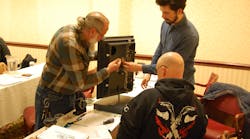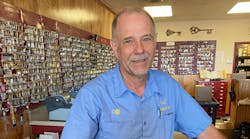I was raised on the East Coast, where licensing has always been a given. When I held a real estate broker license or when I was a senior industrial engineer or worked in composites with a high level clearance, it made no difference. Licensing was always a way to secure the profession.
When I moved to Oregon in 1990, the job market was tough but I was eventually hired at Brod & Mclung, a company that has since changed its name and been purchased by a Japanese company. While there, I attended their apprentice program and was promoted to Tier 1 Journeyman Welder / Assembler of HVAC. The company had frequent layoffs and on one layoff in September 1996, I walked into a locksmith shop and the gentleman offered to sell it to me. I checked it out and purchased it in March 1997. p>
When I found out I had to apply for transfer of the registered name, I did it and the DBA registered name is A Act Fast Locksmith. I also had to get Construction Contractors Board (CCB) #124664 for the state of Oregon because I advertised commercial and residential rekeying, and I did this too.
I soon found out when I joined the Pacific Locksmith Association (PLA) and ALOA that a lot of members hated the CCB and how locksmiths got pooled into their group some 20 years ago. I was told many conflicting stories about who needed licensing. What was required or implied, I checked it out and did my best to do it the right way no matter what my peers taught. I also belong to the North Clackamas Chamber of Commerce and the Better Business Bureau, as well as legallocksmiths.com.
All was fine until approximately 2003 and the emergence of the bait and switch scams. I contacted CCB Enforcement and spoke to Lin Tindell and she said to take the edge and top page of the phonebook for identification purpose, mark the questionable ads, and send them to her. I began doing it slowly and from 2003-2008, the CCB had issued 37 fines to locksmiths as compared to three in the 20 years prior.
But the scammers were growing. So I wrote to the mayors and talked to police chiefs and sheriffs who came in to get keys cut. I spoke to an FBI contact I knew as well. I was nudged by the Portland mayor’s office to contact Rep. Linda Flores, my House representative, and so wrote her a short letter. Dawn Phillips, an aide in Rep. Flores’ office, called me and we began.
I contacted Ernie Blatz, current PLA president, and set up a time for Rep. Linda Flores to meet with the PLA. At a regular PLA monthly meeting, Rep. Flores and Dawn Phillips gave a great motivational speech and made the statement that they could eventually get a locksmith bill passed into law. She answered all questions and assured the skeptics and finally the PLA saw hope. I can’t thank Linda Flores and Dawn Phillips enough. Also thanks to all the PLA members for going beyond their normal scope and into the realm of politics. And thanks to Rep. Huffman who kept the bill moving when Linda Flores was not re-elected and thanks to the CCB for letting us be a bigger piece in their organization and helping us so very much. The bill began as a 21-page perfect draft and became a three-page law. The process was tedious but well worth it.
So from about March 2008 to July 2009 was the timeline before HB3127 was signed into law by our governor. The CCB has spent hundreds of manhours on the administrative rules and the little particulars of the law. The bill has to set up an advisory committee with five locksmith members and one layperson and the CCB meets with them to compile the rules. I have been to a couple of these meetings, and our locksmith representatives have done a good job for us in Oregon.
The procedure for locksmiths to adhere to this new process became available March 1, 2010. I logged onto the Or.gov/ccb web site, Web Site: www. www.oregon.gov/CCB/locksmith.shtml , and took the locksmith certification. It is a new test format and all locksmiths who wish to have a career in Oregon will be required to pass the test. Enforcement of this new law will begin July 1, 2010. For the rules and law, visit the CCB web site.
Locksmithing in Oregon is now a bona fide trade recognized by the state of Oregon. Locksmithing is an active field with ever-changing products and techniques. So is this new law and it is in its infancy.
Locksmithing is about integrity and being forthright with people’s security. We are not here to take advantage of the vulnerable, but to help them on their way. We should have the decency to advertise without deception and to treat our customers fairly to help protect them and their property. I challenge all of my fellow locksmiths to get active with your representatives and mayors. Keep it up until something happens for the good of locksmithing.
Licensing in Other States
According to the ALOA web site, www.aloa.org, the following states currently require locksmith licensing: Alabama, California, Connecticut, Illinois, Louisiana, Nebraska, Nevada, New Jersey, North Carolina, Oklahoma, Tennessee, Texas and Virginia. In addition, New York City and Nassau County on Long Island, NY, have licensing requirements.
ALOA published a legislative report and invites member locksmiths to join the ALOA Legislative Action Network to stay informed of pending legislation in their states. More details about individual state requirements are also posted at www.aloa.org





